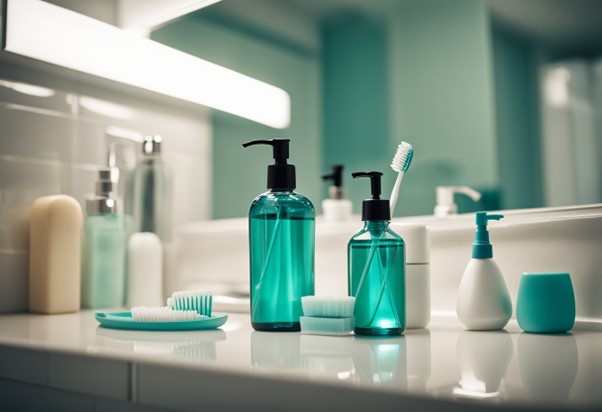8 Best Oral Hygiene Tips
Achieving optimal oral health requires more than just brushing twice a day. While brushing is essential, introducing other habits can significantly enhance dental hygiene. Implementing proper techniques and routines can prevent various dental issues and maintain a bright, healthy smile.
Education plays a crucial role in understanding the best strategies for oral care. These strategies include using the right toothbrush, dental floss, and mouthwash, alongside habits such as regular dental visits. Clear guidance ensures a proactive approach toward maintaining oral health.
One emerging ingredient in oral care that has gained attention is hydroxyapatite. What is hydroxyapatite? It’s a naturally occurring mineral that makes up most of our tooth enamel and bones. In toothpaste, hydroxyapatite helps remineralize teeth, strengthen enamel, and even reduce sensitivity, making it a powerful alternative to traditional fluoride.
Understanding Oral Hygiene
Oral hygiene involves maintaining the health of your teeth and gums through daily practices and professional care. Proper oral health affects overall wellness and can prevent various dental issues.
The Role of Dental Services in Oral Health
Dental services are vital for maintaining optimal oral hygiene. Professional cleanings help remove tartar and plaque that are difficult to eliminate with regular brushing and flossing. Routine dental check-ups allow dentists to identify early signs of cavities or gum disease, enabling prompt treatment. Preventive services, including fluoride treatments and sealants, also protect teeth from future decay. Specialist care is necessary for complex issues such as orthodontics or periodontal disease.
For parents, dentists and dental hygienists can also provide support in teaching the value of healthy teeth. Finding creative ways to encourage their child to brush their teeth is key to helping kids stay committed to the task.
Distinguishing Between Dental Myths and Facts
There are many misconceptions about oral hygiene that need clarification. Myth: Sugar alone causes cavities. Fact: It’s the prolonged exposure of sugar on teeth that leads to decay. Myth: Brushing harder cleans better. Fact: Brushing too hard can damage enamel and gums.
Some believe flossing isn’t necessary, yet it helps remove debris and plaque between teeth. Misunderstandings about whitening products also exist; some may harm enamel if misused. Educating oneself about these facts ensures that the focus remains on effective oral care practices, leading to healthier teeth and gums.
Daily Oral Care Techniques
Daily oral care is essential for maintaining healthy teeth and gums. Proper brushing, flossing, and the use of mouthwash help prevent plaque build-up and promote fresh breath.
Brushing Fundamentals
Effective brushing involves more than just moving a toothbrush around the mouth. Selecting the right toothbrush with soft bristles is crucial. It should be positioned at a 45-degree angle to the gums, allowing the bristles to clean both the teeth and the gum line.
It’s recommended to brush for two minutes twice daily. Cover all surfaces of the teeth: outer, inner, and chewing surfaces. Electric toothbrushes may offer added efficiency, though manual ones are effective when used correctly.
Flossing Essentials
Flossing removes food particles and plaque from between teeth — areas that a toothbrush can’t reach. To floss efficiently, use approximately 18 inches of floss. Wrap it around the fingers and gently insert it between the teeth, following a C-shape motion.
Daily flossing is vital for preventing gum disease and maintaining a healthy mouth. Interdental brushes and water flossers may also be effective alternatives for those who find traditional floss challenging.
Mouthwash and Other Adjuncts
Mouthwash can be a beneficial supplement to brushing and flossing. It helps reduce oral bacteria and aids in freshening breath. Look for mouthwashes containing fluoride or antibacterial agents if recommended by a dental professional.
Using mouthwash once or twice daily can provide additional oral hygiene benefits. Other adjuncts, like tongue scrapers and dental gum, further enhance overall oral hygiene.
Professional Dental Care
Ensuring optimal oral health involves selecting the right dentist, maintaining regular visits, and considering advanced treatments when necessary.
Choosing the Right Dentist
Selecting the right dentist is crucial for maintaining oral health. Individuals should seek professionals with experience and positive patient reviews. It’s beneficial to choose a dentist who is conveniently located, such as a respected dentist in Westbury, making visits easier to manage. Evaluating the dentist’s qualifications and areas of specialization can help in making an informed choice.
Regular Check-ups and Cleaning
Routine dental check-ups are essential for detecting issues early. Dentists recommend visiting at least twice a year for professional cleanings, which remove plaque and tartar build-up that regular brushing might miss. These visits are opportunities to receive personalized advice on improving daily oral hygiene. Regular visits also enable the monitoring of potential concerns such as cavities or gum disease.
Advanced Dental Treatments
Advanced treatments may include cosmetic or restorative procedures depending on individual needs. Teeth whitening, dental implants, and orthodontics are examples of treatments that a skilled dentist might offer.
These services can significantly enhance oral appearance and function, improving overall confidence. It’s vital to discuss treatment options, costs, and recovery with your dentist to make informed decisions.
Lifestyle and Oral Health
Lifestyle choices play a critical role in maintaining oral hygiene, with diet and nutrition, tobacco and alcohol use, and stress levels significantly impacting oral wellbeing.
Diet and Nutrition’s Impact on Oral Health
Diet directly affects oral health by influencing bacteria growth in the mouth. Foods high in sugar and carbohydrates can increase the risk of cavities by feeding harmful bacteria. Consuming plenty of fruits and vegetables aids in saliva production, which naturally cleanses the mouth. Calcium-rich foods such as cheese and yogurt help to strengthen teeth.
Moreover, drinking water not only hydrates but also rinses away food particles. Green tea contains natural antioxidants that may reduce bacteria and acid production.
Tobacco, Alcohol and Oral Wellbeing
Tobacco use, whether smoking or chewing, severely impacts oral health. It raises the risk for gum disease, tooth decay, and oral cancer, while staining teeth and causing bad breath. Alcohol also has adverse effects, including dry mouth, which decreases saliva production and encourages bacterial growth. High alcohol consumption can damage soft tissues in the mouth. Combining tobacco and alcohol significantly increases the risks to oral health, making their minimization or avoidance crucial.
Stress and Oral Health Correlations
Stress influences oral health in several ways, often leading to behaviors that harm the mouth. Elevated stress levels can result in teeth grinding (bruxism) and jaw clenching, causing wear on teeth and discomfort in the jaw. People under stress may also adopt neglectful oral hygiene habits, increasing the risk of periodontal disease.





